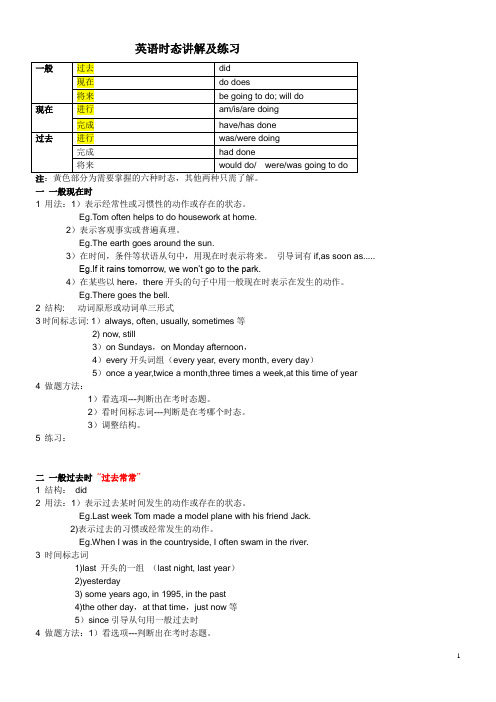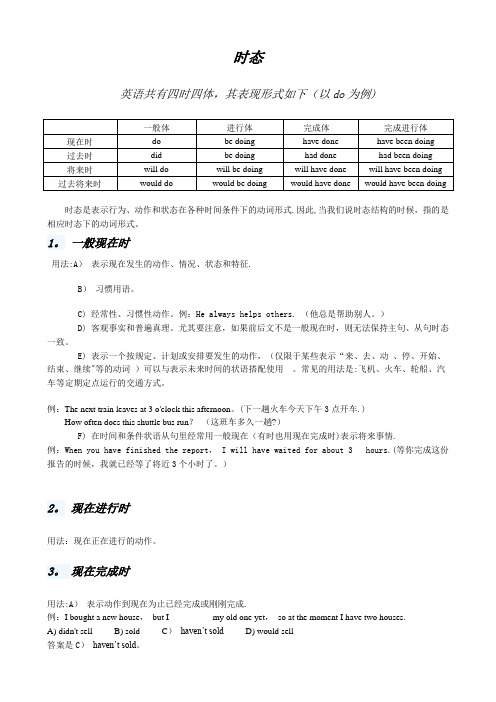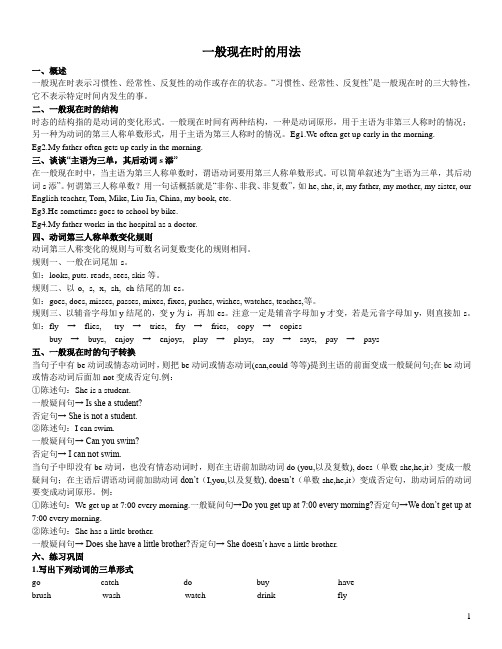中考英语复习 英语之时态讲解与练习(无答案)
超实用 中考英语时态讲解及练习

英语时态讲解及练习一一般现在时1 用法:1)表示经常性或习惯性的动作或存在的状态。
Eg.Tom often helps to do housework at home.2)表示客观事实或普遍真理。
Eg.The earth goes around the sun.3)在时间,条件等状语从句中,用现在时表示将来。
引导词有if,as soon as.....Eg.If it rains tomorrow, we won’t go to the park.4)在某些以here,there开头的句子中用一般现在时表示在发生的动作。
Eg.There goes the bell.2 结构: 动词原形或动词单三形式3时间标志词: 1)always, often, usually, sometimes等2) now, still3)on Sundays,on Monday afternoon,4)every开头词组(every year, every month, every day)5)once a year,twice a month,three times a week,at this time of year4 做题方法:1)看选项---判断出在考时态题。
2)看时间标志词---判断是在考哪个时态。
3)调整结构。
5 练习:二一般过去时“过去常常”1 结构:did2 用法:1)表示过去某时间发生的动作或存在的状态。
st week Tom made a model plane with his friend Jack.2)表示过去的习惯或经常发生的动作。
Eg.When I was in the countryside, I often swam in the river.3 时间标志词1)last 开头的一组(last night, last year)2)yesterday3) some years ago, in 1995, in the past4)the other day,at that time,just now等5)since引导从句用一般过去时4 做题方法:1)看选项---判断出在考时态题。
中考初中八大时态讲解和练习

中考初中八大时态讲解和练习知识点一、八大时态的构成及识记§一般现在时概念:1. 表示经常性、习惯性的动作;2. 表示现时的情况或状态;3. 表示客观事实和普遍真理。
时间状语:always, often, usually, sometimes, once a week, every day等。
如果主句为一般将来时,由if, unless等引导的条件状语从句和when, until, as soon as等引导的时间状语从句常用一般现在时表示将来。
§一般过去时概念:表示过去发生的动作或存在的状态切动作已结束。
时间状语:... ago, last week, yesterday, just now, in 1988等。
§一般将来时概念:表示将要发生的动作或存在的状态以及打算、计划或准备要做的事。
时间状语:tomorrow, next month, in two days, soon等。
there be结构的一般将来时为there will be / there is going to be。
§过去将来时概念:表示在过去将来的某一时间发生的动作或存在的状态。
时间状语:the next day (morning, year...), the following month (week ...) 等。
此时态。
§现在进行时概念:表示现在或现阶段正在发生的动作。
时间状语及提示语:now, these days, at this moment, Listen! Look! 等。
§过去进行时概念:表示过去某一时刻或某一时间段内正在进行的动作。
时间状语:at that time, this time yesterday, at six yesterday, when + 从句(动词为过去式)等。
§现在完成时概念:1. 表示过去发生或已经完成的动作对现在造成的影响或结果;2. 表示从过去某时开始一直延续到现在的动作或状态。
中考英语专项5.时态讲解及习题

时态英语共有四时四体,其表现形式如下(以do为例)时态是表示行为、动作和状态在各种时间条件下的动词形式.因此,当我们说时态结构的时候,指的是相应时态下的动词形式。
1。
一般现在时用法:A)表示现在发生的动作、情况、状态和特征.B)习惯用语。
C) 经常性、习惯性动作。
例:He always helps others. (他总是帮助别人。
)D) 客观事实和普遍真理。
尤其要注意,如果前后文不是一般现在时,则无法保持主句、从句时态一致。
E) 表示一个按规定、计划或安排要发生的动作,(仅限于某些表示“来、去、动、停、开始、结束、继续"等的动词)可以与表示未来时间的状语搭配使用。
常见的用法是:飞机、火车、轮船、汽车等定期定点运行的交通方式。
例:The next train leaves at 3 o'clock this afternoon。
(下一趟火车今天下午3点开车.) How often does this shuttle bus run?(这班车多久一趟?)F) 在时间和条件状语从句里经常用一般现在(有时也用现在完成时)表示将来事情.例:When you have finished the report, I will have waited for about 3 hours.(等你完成这份报告的时候,我就已经等了将近3个小时了。
)2。
现在进行时用法:现在正在进行的动作。
3。
现在完成时用法:A)表示动作到现在为止已经完成或刚刚完成.例:I bought a new house,but I _________ my old one yet,so at the moment I have two houses.A) didn't sell B) sold C)haven’t sold D) would sell答案是C)haven’t sold。
B)表示从过去某时刻开始,持续到现在的动作或情况,并且有可能会继续延续下去。
中考时态汇总讲解+习题(现在,过去,将来,进行,完成)

一般现在时的用法一、概述一般现在时表示习惯性、经常性、反复性的动作或存在的状态。
―习惯性、经常性、反复性‖是一般现在时的三大特性,它不表示特定时间内发生的事。
二、一般现在时的结构时态的结构指的是动词的变化形式。
一般现在时间有两种结构,一种是动词原形,用于主语为非第三人称时的情况;另一种为动词的第三人称单数形式,用于主语为第三人称时的情况。
Eg1.We often get up early in the morning.Eg2.My father often gets up early in the morning.三、谈谈“主语为三单,其后动词s添”在一般现在时中,当主语为第三人称单数时,谓语动词要用第三人称单数形式。
可以简单叙述为―主语为三单,其后动词s添‖。
何谓第三人称单数?用一句话概括就是―非你、非我、非复数‖,如he, she, it, my father, my mother, my sister, our English teacher, Tom, Mike, Liu Jia, China, my book, etc.Eg3.He sometimes goes to school by bike.Eg4.My father works in the hospital as a doctor.四、动词第三人称单数变化规则动词第三人称变化的规则与可数名词复数变化的规则相同。
规则一、一般在词尾加-s。
如:looks, puts. reads, sees, skis等。
规则二、以-o, -s, -x, -sh, -ch结尾的加-es。
如:goes, does, misses, passes, mixes, fixes, pushes, wishes, watches, teaches,等。
规则三、以辅音字母加y结尾的,变y为i,再加-es。
注意一定是辅音字母加y才变,若是元音字母加y,则直接加-s。
江苏中考英语复习之初中英语主要时态系列(一)—— 一般现在时讲解及练习

一、一般现在时有三种形式1. 谓语是be(am/is/are)的一般现在时。
①肯定形式:主语+be+表语(形容词、名词充当表语)。
I am hungry.You are beautiful.He is a doctor.②否定形式:主语+be+not+表语(形容词、名词充当表语)。
I am not hungry.You aren't beautiful.He isn't a doctor.③一般疑问句形式:Be+主语+表语(形容词、名词充当表语)? 肯定回答:Yes,主语+be. 否定回答:No, 主语+ be+not.—Are you hungry?—Yes,I am./No,I'm not.—Is he a doctor?—Yes, he is./No, he isn,t.④特殊疑问句形式:特殊疑问词+Be开头的一般疑问句?—What is he?—He is a doctor.注意:be要随着主语变。
2. 谓语动词是实义动词(及物动词或不及物动词)的一般现在时。
①肯定形式:“主语+及物动词+宾语”或“主语+不及物动词”。
She has a little brother.她有一个弟弟。
The sun rises in the east.太阳从东方升起。
②否定形式:“主语+don't/doesn't+及物动词+宾语”或“主语+don't/doesn't+不及物动词”。
She doesn't have a little brother.她没有弟弟。
I don't eat every morning.我每天早晨都不吃饭。
③一般疑问句形式:“Do/Does+主语+及物动词原形+宾语”或“Do/Does+主语+不及物动词原形”。
肯定回答:Yes,主语+do/does. 否定回答是:No, 主语+ don't/doesn't.—Do you eat every morning?—Yes, I do./No, I don't.—Does she have a little brother?—Yes, she does./No, she doesn't.④特殊疑问句:特殊疑问词+do/does开头的一般疑问句?What do you like?When do you go to school?注意:根据主语确定用do还是does。
(word完整版)初中英语时态讲解及练习(含答案),推荐文档

时态1. 一般现在时●形式:do does(单数第三人称)●意义:一般现在时表示客观的、普遍性的真理以及经常性的事件。
●用法:A) 表示现在发生的动作、情况、状态和特征。
B) 经常性、习惯性动作。
e.g.:He always helps others. (他总是帮助别人。
)He often goes to the gym.C) 客观事实和普遍真理。
尤其要注意,如果前后文不是一般现在时,则无法保持主句、从句时态一致。
e.g.: The sun rises in the east and sets in the west.Knowledge is power.●这一用法场合一些表动作频率的时间副词连用:1). 表示肯定的频率副词:always, frequently, usually, sometimes, generally, occasionally, often etc.2). 表示否定的频率副词:never, seldom, rarely etc.➢这些副词的位置:在Be动词后,实义动词前。
e.g. He is always late.2. 一般过去时●形式:did●意义:一般过去时表示在过去的某一特定时间发生和结束的活动或情况。
●用法:A) 表示过去某个时间发生的动作或情况。
e.g.: I saw him in the library yesterday morning. (有特定的时间状语)➢yesterday, yesterday evening, last night/month/spring/year, the night before last(前天晚上),three days/months/years ago, in 1999 etc.。
这些时间状语之前不用加介词。
B) 表示过去习惯性动作,一直持续或反复发生的动作,此时可与表示拼读的时间副词连用。
e.g.: I slept for eight hours last night. (表示在过去某一段时间内持续的动作,但这动作现在已经结束了)3. 一般将来时●形式:will/shall do或be going to do●意义:一般将来时表示在未来的某个时间将要发生的某个动作或状态。
初中英语时态讲解及练习(全)

时间状语:Tomorrow, next day(week, month, year…),soon, in a few minutes, by…,the day after tomorrow, etc.
否定形式:主语+am/is/are not going to do ; 主语+will/shall not do+其他 一般疑问句:be放于句首;will/shall提到句首。
1.I ____(write, am writing, is writing, are writing) a letter now. 2.Look, it _____(begin, is beginning, am beginning, are beginning) to rain. 3.They ____(study, is studying, am studying, are studying) medicine at the Medical Institute of Chengde these days. 4.He _____(teach, am teaching, is teaching, are teaching) an English lesson at this time.
谓语动词使用过去式形式, 加ed,分为规则和不规则变 化。表示过去经常发生的动 作,也可用“used to do ” 和“would +动词原形”。
1. He____(be, was, were, been) here a moment ago. 2. They ____(be, was, were, been) here just now. 3. The scientists _____(leave, leaves, leaved, left) for America yesterday. 4. Last week we ______(visit, visited ) the Science Museum. 5. When I was a child, I often ____(play, played) football. 6. The students ran out of the classroom as soon as the bell ____(ring, rang, rung).
初中中考英语知识点总结初中英语主要时态系列(一)—— 一般现在时讲解及练习

一、一般现在时有三种形式1. 谓语是be(am/is/are)的一般现在时。
①肯定形式:主语+be+表语(形容词、名词充当表语)。
I am hungry.You are beautiful.He is a doctor.②否定形式:主语+be+not+表语(形容词、名词充当表语)。
I am not hungry.You aren't beautiful.He isn't a doctor.③一般疑问句形式:Be+主语+表语(形容词、名词充当表语)? 肯定回答:Yes,主语+be. 否定回答:No, 主语+ be+not.—Are you hungry?—Yes,I am./No,I'm not.—Is he a doctor?—Yes, he is./No, he isn,t.④特殊疑问句形式:特殊疑问词+Be开头的一般疑问句?—What is he?—He is a doctor.注意:be要随着主语变。
2. 谓语动词是实义动词(及物动词或不及物动词)的一般现在时。
①肯定形式:“主语+及物动词+宾语”或“主语+不及物动词”。
She has a little brother.她有一个弟弟。
The sun rises in the east.太阳从东方升起。
②否定形式:“主语+don't/doesn't+及物动词+宾语”或“主语+don't/doesn't+不及物动词”。
She doesn't have a little brother.她没有弟弟。
I don't eat every morning.我每天早晨都不吃饭。
③一般疑问句形式:“Do/Does+主语+及物动词原形+宾语”或“Do/Does+主语+不及物动词原形”。
肯定回答:Yes,主语+do/does. 否定回答是:No, 主语+ don't/doesn't.—Do you eat every morning?—Yes, I do./No, I don't.—Does she have a little brother?—Yes, she does./No, she doesn't.④特殊疑问句:特殊疑问词+do/does开头的一般疑问句?What do you like?When do you go to school?注意:根据主语确定用do还是does。
- 1、下载文档前请自行甄别文档内容的完整性,平台不提供额外的编辑、内容补充、找答案等附加服务。
- 2、"仅部分预览"的文档,不可在线预览部分如存在完整性等问题,可反馈申请退款(可完整预览的文档不适用该条件!)。
- 3、如文档侵犯您的权益,请联系客服反馈,我们会尽快为您处理(人工客服工作时间:9:00-18:30)。
初中英语之时态一:一般现在时1:概念:经常;反复发生的动作或行为以及现在的某种状况。
2:时间状语:3:基本结构:(be型;行为动词型)she is a beautiful girl. My mother often does some washing .肯:主+be+其他主语+行为动词+其它否:疑:4:适用情况:a:一般的情况;性质;状态.eg:他们居住在同一栋建筑里.b:经常习惯发生的事情。
eg:他每天工作8个小时。
c:表示按计划日程表确定的事情。
eg:会议在下午2点开始。
d:客观真理事实。
eg:太阳东升西落。
e:时间;条件,让步状语从句中,主将从现。
eg:如果我有时间,我将去帮助你们二:一般过去时1:概念:表示过去发生的动作或状态,也可表示过去经常或反复发生的动作。
2:时间状语:3:基本结构:(be型;行为动词型)she was good at Chinese at the age of five My brother went to school yesterday.肯:主+be(过去式)+其他主语+行为动词(过去式)+其他否:疑:4:适用情况:a:纯粹过去的事情。
eg;邓和宁昨天在一起打羽毛球。
b:过去经常习惯发生的事情。
eg:当我们是孩子的时候我们经常一起爬山三:一般将来时1:概念:将来时间要发生的动作或存在的状态及打算,计划或准备做某事2:时间状语:3:基本结构:(be+ going to do ;will/shall+ do)I'm going to fly a kite this afternoon I will go to the theater tonight肯:主+be going to+其他主语+will+动词原形+其他否:疑:4:适用情况:a:be to do sth. 可表按计划安排将要发生的动作。
eg:这些书将要出版了.b: be about to do。
强调近期内或马上要做的事,后常与when连用。
eg:我将准备说话的时候你打断了我c:有些动词,如:arrive, be close, come, do, done, go, have, leave, open, play, return, sleep, start, stay等,用一般进行时表将来。
(位移动词表将来/现在进行时表将来)eg:邓康乐的妈妈下周将来看望他。
四:现在进行时1:概念:现在进行时表示此时此刻或当前这一段时间正在进行的动作,也可表示现阶段正在进行的动作。
2:时间状语:3:基本结构:(be+doing)he is teaching at a night school these days 。
肯:主+be+ doing+其他否:疑:4:适用情况:a: 说话时正在发生。
eg:当我们聊天时,露老师正在敲门。
b: 现阶段正在发生。
eg:这些天宁泽霖在和同学打篮球。
c:与always;continually;constantly;never连用表达情感。
eg:邓康乐总是忘记重要的语法知识点。
五:过去进行时1:概念:过去进行时表示过去某时或某段时间正在发生的动作,常与从句等特定的过去时间连用。
2:时间状语:3:基本结构:(be(过去式)+doing)He was cooking at six last night.肯:主+be(过去式)+ doing+其他否:疑:4:适用情况:a: 过去某一时间点正在进行。
邓康乐昨天这个时间正在听音乐。
b:过去某一时间段正在进行。
宁泽霖昨天整个早上都在做作业。
c:时间状语从句中,延续时间较长用过去进行时。
当我进入教室时,邓和宁正坐在座位上。
六:现在完成时1:概念:1. 现在完成时表示过去的动作对现在造成了影响和结果2.现在完成时还可表示过去已经开始,持续到现在或将来的动作或状态.2:时间状语:3:基本结构:(have/has+done/been)I have taught English for five years肯:主+ have/has+done +其他否:疑:4:适用情况:a: 过去的动作对现在有影响eg:我花完了我所有的钱。
b:表示发生在过去某一时刻的,持续到现在的动作eg:Mary 已经病了三天了c:this/it is the first/second time+ that从句eg:这是我第一次来北京。
d:this/that is the +形容词最高级+that 从句eg: 邓康乐是我见过的最帅气的男生e: 现在完成时或一般现在时+since 从句eg:自从六年前宁泽霖就开始学英语了。
七:过去完成时1:概念:过去完成时常用在主句是一般过去时,从句的动作比主句更前发生的宾语从句中,表“过去的过去”。
2:时间状语:3:基本结构:(had+done/been)I heard he had lived there for five years.肯:主+ had+done +其他否:疑:4:适用情况:(过去的过去)eg:到上学期你们学会了多少首歌?eg:当我们到达电影院时,电影已经开始五分钟了课堂练习+家庭作业Ⅰ.写出下列动词的单数第三人称形式。
(15分)1. allow ________2. fly ___________3.push ________4. do __________5. watch ________6. build _________7.circle________8. carry________9. have _________ 10. wash ________ 11. guess ______ 12. go _________13. pause _______ 14. own _________ 15. notice ______ 16. receive ______17. rush ________ 18. search _______ 19. train _______ 20. cook ________21. press _______ 22. enjoy ________ 23. dive _______ 24. choose ______25. fix _________ 26. mention ______ 27. lie _________ 28. miss ________29. play ________ 30. reach ________II. 写出下列动词的现在分词形式。
(15分)1. put __________2. drink ________3. cry ________4. pull ________5. ride _________6. begin ________7. sit _________8. run _________9. take _________ 10. sweep _______ 11. stop _______ 12. solve _______13. rob ________ 14. wait _________ 15. lie _________ 16. turn ________17. explore _______ 18. drop _________ 19. clean _______ 20. produce _____21. offer _________ 22. laugh ________ 23. pay ________ 24. die _________25. send _________ 26. shoot ________ 27. set ________ 28. warn _______29. trap _________ 30. get __________III. 选择。
(60分)1.I will tell him as soon as he _____ backA. comeB. comesC. will comeD. came2. Mary _____ on shoes when she ____ them.A. trie s…buysB. tries… buiesC. trys… buysD. trys… buies3. The girl often ______ cold when she ______.A. cathcs…dancesB. catches… dancesC. catchs…danceesD. catches… dance4. _____ he ____ himself there? No, I don't think so.A. Do…enjoyB. Does… enjoiesC. Does… enjoysD. Does…enjoy5. _____ your teacher ____ from them very often? Certainly.A. Do…hearB. Does…hearC. Do… receiveD. receive6. _____ your mother _____ some cleaning on Sundays?A. Does…doesB. Do…doesC. Does…doD. Do… do7. _____ Tom _____to work hard to help his family ? Yes, he _____.A. Has… x…doesB. Has…x…doesC. Does…has…hasD. Does… have…does8. Which teacher _____ lessons to you every day ?A. does …givesB. does… giveC. do… giveD. gives9. Smith does not go fishing on weekdays, ____? _____ , he does.A. does he…NoB. does he…YesC. doesn't he…NoD. doesn't he…Yes10.Mr Black often _____ fishing on Sundays, _____ he ?A. goes…doesn'tB. goes…isn'tC. doesn't go…doesD. doesn't go…is11.He usually _____ TV on Sunday evening.A. watchB. watchesC. watchingD. is watching12. We'll go to play with snow if it ______ tomorrow.A. snowB. snowsC. will snowD. snowed13. Neither I nor he ______ French.A. speakB. doesn't speakC. speaksD. doesn't speak14. Nobody ______ how to run this machines.A . know B. have known C. knows D. is knowing15. The Young Pioneer _____ water for the old man every day.A. carryB. bringC. takesD. carries16. Some are ______ in the river and some are ______ games.A. swimming… playingB. swimming…plaiingC. swimming… I playingD. swimming…plaing17. Look ! The boy students are _____ football while the girls are _____ .A. playing… danceB. playing… dancingC. play… dancingD. play… dance18. He _____ to do his lessons at eight every evening.A. is beginningB. is beginningC. beginD. begins19. _____ he _____ on well with his friends this term ?A. Does…getsB. Does…getC. Is…gettingD. Is…geting20. Mr Smith _____ short stories, but he ____ a TV play these days.A. is writing…is writingB. is writing… writesC. writes… is writingD. writes… writes21. I _____ to the cinema. I ______ there every Sunday.A. go…goB. am going… goC. go… am goingD. am going…am going22. Look, they______ a good time, ____ they ?A. have…doB. have…don'tC. are having…areD. are having… aren't23. You ______ about the future now, ______ you ?A. don't think…don'tB. aren't thinking… aren'tC. don't think… doD. aren't thinking… are24. She always ______ something whenever she ______.A .studied…played B. studied…plaied C.. studied…plaied D. studied… played25. He often _____ late in the forest. It _____ me very much.,A. stayed…worriedB. staied… worriedC. stayed…worryedD. staied… worried26. I ______that the boy _____ with no tears in his eyes.A. not iced… cryedB. noticed… criedC. noticed…criedD. noticed… cryed27. We _____the floor and _____ all the windows.A. mopped… cleannedB. moped… cleanedC. mopped…cleanedD. moped… cleaned28. When I _____ the Children's Palace, the children _____ with joy.A. visited… jumppedB. visited… jumpedC. visited… jumpedD. visited… jumpped29. ______ a sports meet last Sunday ? Yes , they ______.A. Did they have… didB. Did they have… hadC. Had they... had D. Had they (i)30. ____ you _____out for a walk after supper ? Yes, I ______.A. Did...went...went B. Did... go... went C. Did... went... did D. Did... go (i)31. _____ Jack _____ on with his work or ______ to have a rest?A. Did… went… stoppedB. Did… go… stopC. Did… went… stopD. Did… go… stopped32. You gave them a talk two days ago, _____you ? Yes, I ______.A. did… didB. did… gaveC. didn't… didD. didn't… gave33. ____ your brother _____ a letter to ? My father.A. Who… wroteB. What…wroteC. Who did…writeD. What did… write34. They _____ about the TV news then in the sitting-room. They often ____ such talksA. talked…hadB. talk…haveC. were talking…hadD. are talking…have35. He ______ some cooking at that time, so _____ me.A. did… heardB. did… didn't hearC. was doing… heardD. was doing… didn't hear36. " _____ you angry then?" "They_ too much noise.”A. Are…were makingB. Were…were makingC. Are…madeD. Were… made37. This time yesterday Jack _____ his, bike. He _____ TV.A. repaired… didn't watchB. was repairing… watchedC. repaired… watchedD. was repairing… wasn't watching38. We _____ for Tom at ten last Sunday. He often kept us ______.A. were waiting… waitingB. were waiting… waitC. waited… waitingD. waited… wait39. When you _____ at the door, I _____ some washing.A. knocked… didB. was knocking… didC. knocked… was doingD. knock… am doing40. The boy_____ English on the radio when I _____ his door.A. learned… was openingB. was learning… opene dC. learned… openedD. is learning… open41. When they______ through the forest, a bear _____ at them.A. walked… was comingB. were walking… cameC. were talking… comesD. walk… is coming42. A young man _____ her while she _____ her work .A. watched… was finishingB. was watching… finishedC. watched… finishedD. was watching… was finishing43. While mother _____ some washing, I ______ a kite for Kack.A. did… madeB. was doing… madeC. was doing… was makingD. did… was making44. I _____ myself French from 7 to 9 yesterday morning. I _____ to work.A. was teaching… didn't goB. taught… didn't goC. was teaching… wentD. taught… went45. He _____ a model plane when I came to see him.A. makesB. is makingC. was makingD. made46. I ______ a letter at nine last night.A. is writingB. was writingC. wroteD. is writing47. The teacher_____ (give) us a history lesson when Tom walked into the classroom.A. gaveB. is givingC. was givenD. was giving48. There will be a football match in two days, that is _______.A. last SundayB. next SundayC. every SundayD. this Sunday49. We ______ class meeting this November.A. hadB. haveC. will haveD. are having50. He ______ in his garden every morning next year.A. will workB. worksC. workedD. is working51. Be careful. The train ______.A. will comeB.C. comesD. is coming52. Look at those clouds. It _____ soon, I'm afraid.A. is going to rainB. is rainingC. will rainD. won't rain53. The radio says it ______ the day after tomorrow.A. is going to snowB. is snowingC. will snowD. snows54. _____ he _____ some shopping tomorrow afternoon ?A. Will…doesB. is going to doC. is…doingD. Shall… do55. What day _____ it ______ tomorrow ? Wednesday.A. is… going to beB. will…beC. shall…beD. does…be56. The boy _______ sixteen years old next year.A. is going to beB. is growing to beC. will beD. is57. _____ you ____ me up at six, please ?A. Are…going to wakeB. Are…wakingC. Will…wakeD. Do…wake58. If he ______ to college, he _____ a lot more.A. will go…will learnB. will go…is going to learnC. is going… is going to learnD. goes… will learn59. When she _____ next time ,l ______ her everything.A. is going to come…shall tellB. will come…shall tellC. comes…will tellD. come…will tell60. What day ____ it ____ tomorrow ? It ____Tuesday.A. is…going to be… isB. will…be…willC. is…going to be…is goingD. will be…will be IV. 用所给动词的正确形式填空。
